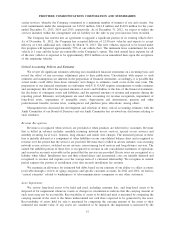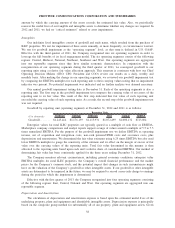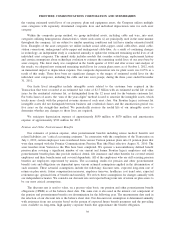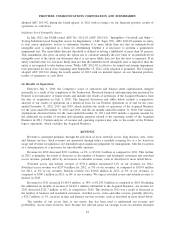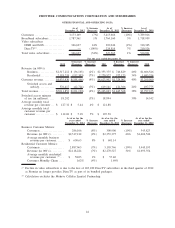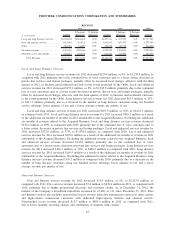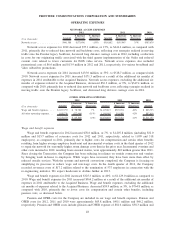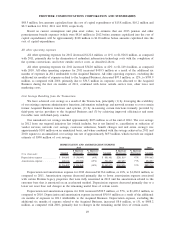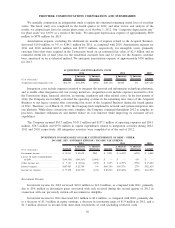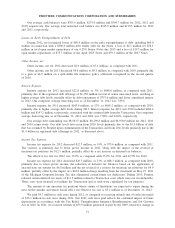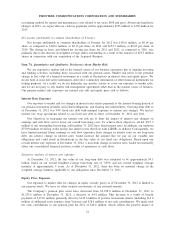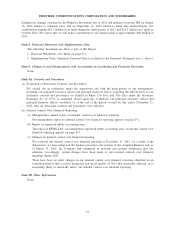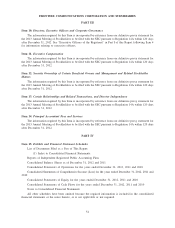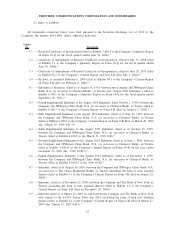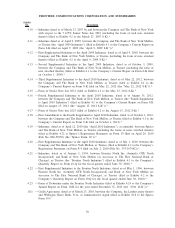Frontier Communications 2012 Annual Report Download - page 48
Download and view the complete annual report
Please find page 48 of the 2012 Frontier Communications annual report below. You can navigate through the pages in the report by either clicking on the pages listed below, or by using the keyword search tool below to find specific information within the annual report.primarily due to decreased support for local switching, the Federal Universal Service Fund and the Federal
High Cost Fund.
Federal and state subsidies and surcharges (which are billed to customers and remitted to universal service
administrators) for the Company were $160.7 million, $38.2 million and $119.7 million, respectively, and
$318.6 million in total, or 6% of our revenues, for 2012. The federal and state subsidy revenue for 2012
represents 4% of our consolidated revenues. Total federal and state subsidies and surcharges were $300.1
million, or 6% of our consolidated revenues, for 2011 and $212.3 million, or 6% of our consolidated revenues
for 2010.
On November 18, 2011, the FCC released a Report and Order and Further Notice of Proposed Rulemaking
on the subject of Universal Service Fund and intercarrier compensation reform. The Order changed how federal
subsidies will be calculated and disbursed, with these changes being phased-in beginning in 2012. These
changes transition the Federal Universal Service High-Cost Fund, which supports voice services in high-cost
areas, to the CAF, which supports broadband deployment in high-cost areas. CAF Phase I, implemented in
2012, provides for ongoing USF support for price cap carriers to be capped at the 2011 amount. In addition, the
FCC in CAF Phase I made available for price cap ILECs an additional $300 million in incremental high cost
broadband support to be used for broadband deployment to unserved areas. Frontier was eligible to receive
$71.9 million of the total $300 million CAF Phase I interim support. On July 9, 2012, Frontier announced that
it would accept all of the funding for which it is eligible. On July 24, 2012, Frontier formally notified the FCC
and appropriate state commissions of its intent to accept those funds and identified the unserved locations to be
served using the funds. The $71.9 million in incremental CAF Phase I support is expected to enable an
incremental 92,877 households for broadband service and will be accounted for as Contributions in Aid of
Construction. Frontier is required to implement, spend and enable these 92,877 households no later than July
24, 2015. As of December 31, 2012, Frontier has received $66.0 million of the CAF Phase I support funds and
has initially recorded as increases to Cash and Other liabilities in the balance sheet. The FCC is currently
considering the rules for distribution of incremental CAF funding in 2013.
The Order also makes changes to Intercarrier Compensation. Intercarrier Compensation, which is the
payment framework that governs how carriers compensate each other for the exchange of interstate traffic, will
transition over a number of years, with the first step being implemented in July 2012, to a near zero rate for
terminating traffic by 2017. Frontier will be able to recover a significant portion of those revenues through end
user rates and other replacement support mechanisms.
Effective December 29, 2011, the Order required providers to pay interstate access rates for the
termination of VoIP toll traffic. On April 25, 2012, the FCC, in an Order on Reconsideration, specified that
changes to originating access rates for VoIP traffic will not be implemented until July 2014. The Order has
been challenged by certain parties in court and certain parties have also petitioned the FCC to reconsider
various aspects of the Order. With the initial implementation commencing in July 2012, the second half of
2012’s impact was immaterial.
Certain states also have their own open proceedings to address reform to intrastate access charges and
other intercarrier compensation and state universal service funds. In addition, we have been approached by,
and/or are involved in formal state proceedings with, various carriers seeking reductions in intrastate access
rates in certain states. Although the FCC has pre-empted state jurisdiction on certain access charges, many
states are still considering moving forward with their proceedings. We cannot predict when or how these
matters will be decided or the effect on our subsidy or switched access revenues. However, future reductions in
our subsidy or switched access revenues may directly affect our profitability and cash flows as those regulatory
revenues do not have an equal level of associated variable expenses.
47
FRONTIER COMMUNICATIONS CORPORATION AND SUBSIDIARIES


